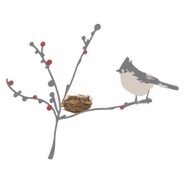Frequently Asked Questions
~ How long is the postpartum season?
Postpartum literally means "after" birth. While we are accustomed to thinking of postpartum as the first 6-8 weeks, or perhaps extending through the "4th trimester", your body will be physiologically and psychologically different for many years after birth. Accepting that achieving health on a physical and emotional level can begin in the early days and weeks, but will likely continue for years, will better shape your expectations and your skills to achieve a truly nurtured transition into motherhood. Whether you're pregnant or well-past childbirth, it's never too early or too late to take care of you. The nurtured mother nurtures best!
~ What if I don't intend to breastfeed exclusively - can I still benefit from your postpartum support services?
Yes! Breastfeeding needs and goals can look different for each family, and we want to meet you where you are. Some want to feed exclusively at the breast, some choose to nurse and offer bottles, while others may want or need to exclusively pump or supplement. We believe that a solid understanding of the physiology of lactation and the bond established through breastfeeding will equip parents to make an informed decision about their feeding options. If you choose not to breastfeed, your postpartum experience can still be enhanced by the nourishing meals and other areas of support we provide!
~ Why do you prioritize in-home support in the early weeks?
Our support is strategically designed to support families from the day they birth or return home from the hospital through the 4th trimester. We know that the postpartum journey extends well past this, yet the earliest days and weeks establish the trajectory of the first year with your baby. Pregnancy & birth are the beginning of a transformation that culminates in the early weeks, as mothers seek to reach their breastfeeding goals, adapt to their baby's needs, rest and nourish their mind & body, and settle into a new normal. Milk supply is best established in the first 4-6 weeks, yet many mothers feel lost and vulnerable as they try make sense of the guidance they're given after birth and only seek help from a lactation specialist when problems arise. What if you have a doula by your side who can help you identify and address concerns in real-time, nurture your intuition, support your nutritional needs, and help you curate your home environment? It's a lot! It can feel lonely. We've been there and want you to feel compassion and empowerment more than frustration or exhaustion!
~ What does your sleep support look like? Is it sleep training?
Our support and education are an alternative to strict scheduling and cry-it-out methods. We believe in nurtured and responsive parenting, and we recognize that infants need their parents for co-regulation and safe, secure sleep. Support in the newborn days is more about addressing expectations, reading your baby's cues (hungry vs. sleepy vs. overstimulated, etc.), and finding ways that parents can align their sleep needs with their baby's. Support around 4-6 months and beyond will explore healthy routines for bedtime or naptime, giving your baby an opportunity to sleep more independently, and feeling prepared for developmental milestones that impact sleep.
~ How will your support impact my partner's role?
We recognize that partners/fathers also experience a huge transformation surrounding birth - a shift in relationships and responsibilities. Our goal is to support your partner's skills and communication so they feel confident in bonding and caring for their baby and and validated as they support you as only they can!
~ What about sibling care?
We understand the transition that siblings are going through, too! While we do not provide childcare/babysitting, we can sure read them a book while you take a shower or nurse your newborn. We can also include siblings in the light housekeeping and meal prep that is part of our support role, if you desire, but if you need extensive care for your other children's naps, meals, play time, or bed time, we encourage you to lean on your partner or other family members for that support. Our shifts are oriented primarily around mother and baby!
~ What is nighttime parenting?
Many postpartum doulas offer overnight care, yet we believe that that parents have a unique opportunity to bond with their baby overnight - to recognize their needs, habits, and communication in ways that will support connection and secure sleep development. We also know that loss of sleep takes its toll and will support you with strategies that accommodate rest for all!
~ Tell me more about postpartum-specific meals
Your postpartum body is amazingly designed to heal, and food can either support or hinder your recovery. Pregnancy and birth have changed a mother's digestion and nutritional needs. You need nutrient-dense foods that are easy to digest and provide needed fat and protein. It's a great time to take a break from raw foods, salads, and smoothies during the early weeks and lean into nourishing and warming foods like herbal teas, broths, soups, stews, and casseroles that are gluten & dairy free (to avoid unnecessary inflammation). Nourishing your body during postpartum will have a long-term impact on your health!
~ What is involved in gentle bodywork?
Babies rely on their parents for co-regulation of their little nervous systems to sleep, settle, and develop. But, what regulates the parent's system to provide the best nurture for their babies? That's how Dynamic Body Balancing, based on in craniosacral & myofascial therapy, can help you! Whether you're dealing with pain, lactation challenges, sleep issues, or emotional/physical trauma post-birth, etc., your body needs and wants to be back in balance. Our gentle bodywork can support you to make the switch from operating primarily from your sympathetic nervous system (flight or fight) to the parasympathetic nervous system (rest & digest).
SERVING WEST FORT WORTH & SURROUNDING COMMUNITIES

